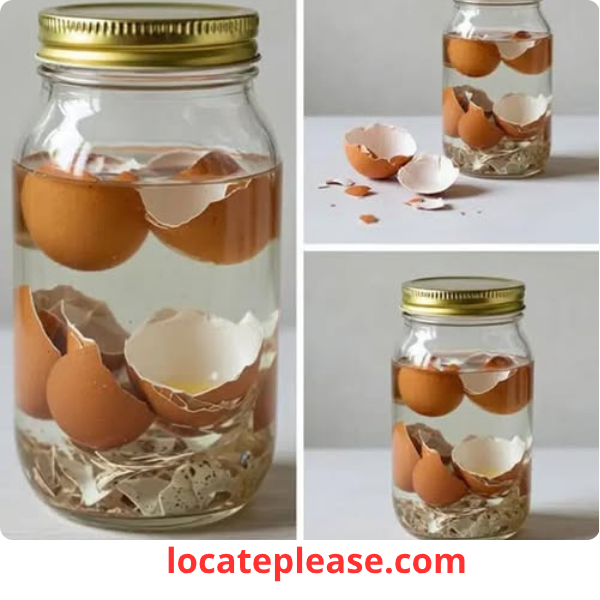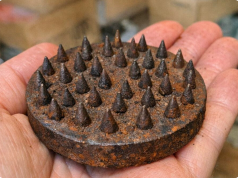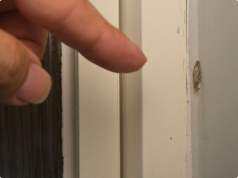Every day, millions of eggs are cracked open for breakfast, baking, or cooking — and just as quickly, their calcium-rich shells are tossed into the trash without a second thought.
But what if we told you that those fragile, chalky shells are one of nature’s most powerful garden helpers?
Instead of discarding them, try this simple trick:
👉 Soak eggshells in hot water — and watch what happens.
Not only will they soften, making them easier to crush, but the water itself becomes a nutrient-rich solution you can use to nourish your plants. And that’s just the beginning.
Let’s explore why eggshells are a hidden treasure for your garden — and how to use them the right way.
Why Eggshells Are a Gardener’s Secret Weapon
Eggshells are 93% calcium carbonate — the same compound that gives plants strong cell walls and healthy root systems. They also contain small amounts of magnesium, potassium, phosphorus, and nitrogen — all essential nutrients for vibrant plant growth.
When added to soil, eggshells:
- Boost calcium levels, preventing blossom-end rot in tomatoes, peppers, and squash
- Improve soil structure and drainage
- Help balance soil pH, reducing acidity over time
- Deter soft-bodied pests like slugs and snails (the sharp edges act as a natural barrier)
And unlike synthetic fertilizers, eggshells release nutrients slowly and naturally — no risk of burning your plants.
What Happens When You Soak Eggshells in Hot Water?
Soaking clean eggshells in hot (not boiling) water does more than just sanitize them — it starts a gentle extraction process.
Here’s what happens:
- The heat helps kill any lingering bacteria (like salmonella).
- Minerals — especially calcium — begin to leach into the water.
- The shells soften slightly, making them easier to crush later.
After soaking for 5–10 minutes, you’re left with:
- Mineral-enriched water — perfect for watering plants
- Clean, sanitized shells — ready to dry and crush
💡 Bonus: Use the cooled eggshell-infused water to water indoor or outdoor plants — it’s like a light calcium tonic!
How to Prepare Eggshells for Garden Use
Follow these simple steps to turn kitchen waste into garden gold:
Step 1: Rinse & Soak
- After cracking eggs, rinse the shells to remove any egg residue.
- Soak them in hot water for 5–10 minutes to sanitize and soften.
Step 2: Dry Thoroughly
- Spread shells on a baking sheet or towel.
- Let them air-dry for 24–48 hours — or bake at 200°F (95°C) for 10 minutes to speed up drying.
Step 3: Crush Into Small Pieces
- Place dried shells in a ziplock bag or bowl.
- Crush with a rolling pin, mortar and pestle, or blender.
- Aim for fine powder (best for soil) or small chips (great for mulch).
3 Ways to Use Eggshells in Your Garden
🌱 1. Mix Into Soil as Natural Fertilizer
- Sprinkle crushed eggshells into planting holes or mix into potting soil.
- Ideal for tomatoes, peppers, broccoli, and roses — all calcium-hungry plants.
🐌 2. Use as Pest-Repellent Mulch
- Scatter crushed shells around the base of plants.
- The sharp edges deter slugs, snails, and cutworms without harming beneficial insects.
🥚 3. Start Seedlings in Eggshell “Pots”
- Carefully crack the top off an egg, empty it, and rinse.
- Fill with soil and plant a seed.
- Once seedlings grow, plant the whole shell in the garden — it will biodegrade and feed the plant.
Important Tips & Warnings
✅ Always clean and dry eggshells first — raw residue can attract pests or mold.
✅ Crush well — large pieces break down slowly and may take months to release nutrients.
⚠️ Don’t overdo it — too many eggshells can raise soil pH too much, making it too alkaline.
🚫 Avoid dyed or decorated Easter eggs — chemicals and dyes can harm plants.
Final Thoughts: Waste Nothing, Grow More
That humble eggshell you were about to toss?
It’s not trash.
It’s free fertilizer.
It’s natural pest control.
It’s soil enrichment in disguise.
By simply soaking, drying, and crushing your eggshells, you’re not just reducing waste — you’re giving your garden a powerful, sustainable boost.
So next time you scramble eggs or boil them for a salad…
Pause.
Save the shells.
And let your plants reap the benefits.
Because the best things in gardening often come from the kitchen — one egg at a time.






